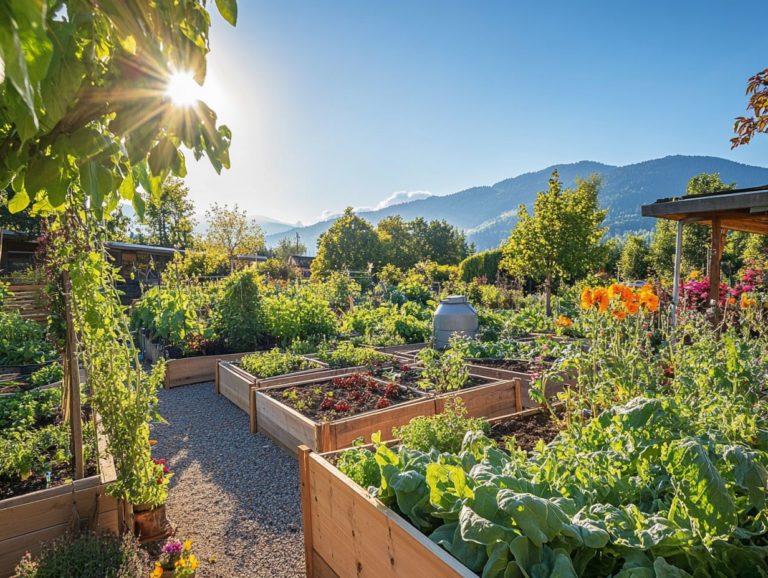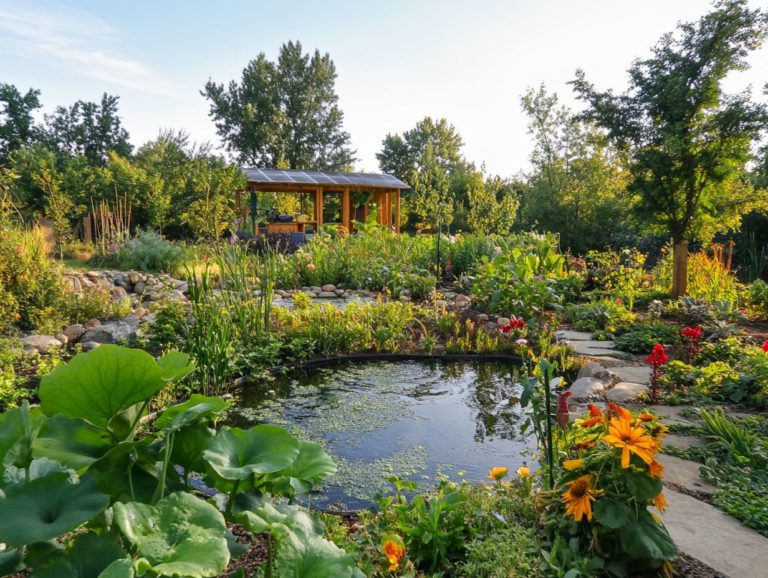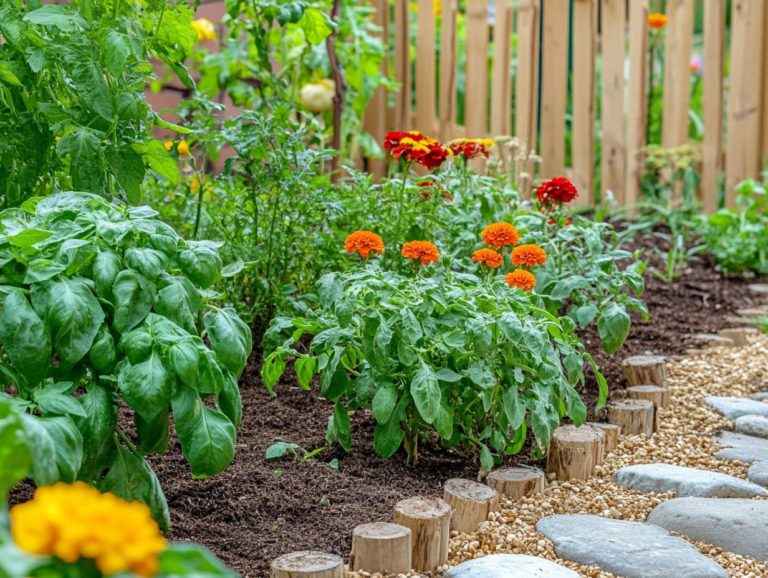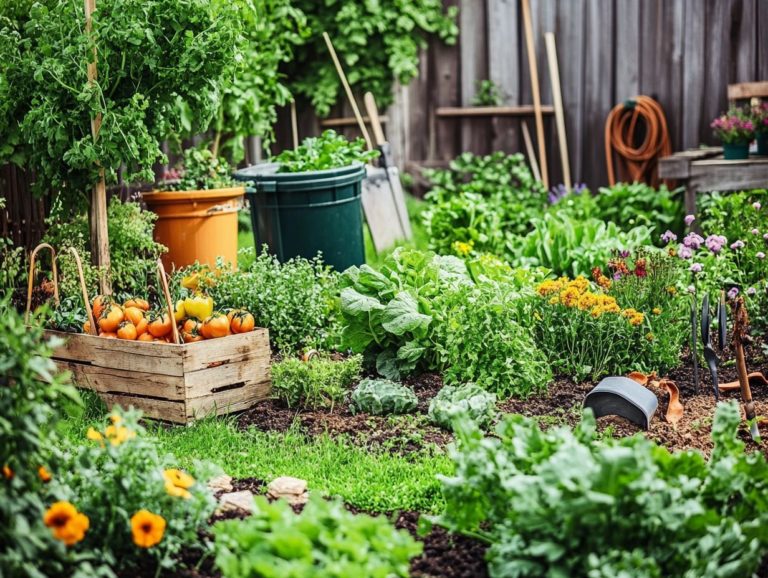How to Build a Network of Permaculture Supporters?
Building a network of permaculture supporters is vital for nurturing sustainable practices and crafting vibrant communities. Let s explore the exciting world of permaculture and its amazing benefits!
You ll discover how to identify potential supporters, engage them effectively, and collaborate toward shared goals. Join us in building a vibrant community focused on sustainable living!
Contents
- Key Takeaways:
- Understanding Permaculture
- Benefits of Building a Network of Permaculture Supporters
- Identifying Potential Supporters
- Engaging and Educating Supporters
- Collaborating with Supporters
- Maintaining and Growing the Network
- Frequently Asked Questions
- What is permaculture and why is it important to build a network of supporters?
- How do I start building a network of permaculture supporters?
- Who should I reach out to when trying to build a network of permaculture supporters?
- What are some effective ways to engage and connect with potential permaculture supporters?
- How can I ensure the sustainability and growth of my permaculture network?
- Can I build a network of permaculture supporters even if I am not an expert in permaculture?
Key Takeaways:

- Engage and educate potential supporters through effective communication strategies to build a strong network of permaculture advocates.
- Collaborate with individuals and organizations sharing a common goal to create a greater impact in the environment and community.
- Cultivate relationships and sustain momentum by consistently maintaining and growing the network of permaculture supporters.
- Don t miss out on the chance to make a difference get involved today!
Understanding Permaculture
Understanding permaculture invites you to delve into a sophisticated set of ecological design principles crafted to cultivate sustainable and self-sufficient agricultural systems. This journey encompasses the integration of local Indigenous knowledge and a profound respect for nature.
Embracing this holistic approach goes beyond mere food production; it emphasizes community engagement, the redistribution of resources, and practices that confront unfair systems that disadvantage certain groups and inequalities. Ultimately, it fosters a richer connection with the environment and the local ecosystems, enriching your experience and understanding of the world around you.
Definition and Principles
Permaculture principles encompass a suite of ecological design methods aimed at creating sustainable and resilient systems that not only support community building but also champion social justice initiatives.
These foundational elements inspire you to observe and engage with your natural environment, allowing you to grasp the complex relationships that exist within ecosystems. By efficiently cycling energy and promoting understanding of design principles, you can leverage local resources with greater effectiveness.
This holistic approach not only enhances food security but also empowers marginalized communities. In tackling issues of inequality, these principles provide a framework for decolonization, the process of addressing historical injustices faced by Indigenous peoples, transforming power dynamics by advocating for equitable resource distribution.
They also offer anti-oppression training, equipping you with the tools necessary for fostering community-driven change.
Benefits of Building a Network of Permaculture Supporters
Building a network of permaculture supporters offers you a wealth of benefits. It enhances community engagement, fosters environmental justice, and empowers youth while promoting social justice initiatives through sustainable practices. Learning how to foster a culture of permaculture in your community can amplify these efforts even further.
By connecting with like-minded individuals, you contribute to a movement that not only nurtures the planet but also strengthens the community fabric.
Environmental and Community Impact
The impact of permaculture on environmental and community outcomes is nothing short of transformative. It tackles unfair systems that disadvantage certain groups while nurturing ecological design practices that enhance local ecosystems.
By prioritizing biodiversity, permaculture cultivates resilient habitats where diverse plant and animal species coexist harmoniously, weaving together a vibrant ecological tapestry. This holistic approach not only boosts soil health through methods like composting and cover cropping but also conserves resources by employing rainwater harvesting and energy-efficient designs.
On the community front, permaculture fosters grassroots movements that empower individuals, bridging social divides and championing equality. As these practices take root, they inspire collective action, allowing communities to confront challenges such as food insecurity and environmental degradation.
Ultimately, this leads to a more just and sustainable future for all.
Identifying Potential Supporters

Recognize potential supporters for your permaculture initiative. These are individuals and organizations committed to community growth. Look for those eager to engage in design processes that involve everyone aimed at addressing inequalities.
By connecting with these passionate advocates, you can cultivate a robust network that champions your vision and enhances the impact of your efforts.
Targeting Individuals and Organizations
Target the right individuals and groups to enhance community engagement in permaculture. Focus on those who are passionate about social justice and anti-oppression training.
To effectively connect with potential supporters, engage with local Indigenous groups that hold invaluable insights into ecological stewardship and land management practices. Form alliances with environmental organizations to amplify your efforts, integrating sustainability initiatives that resonate within diverse communities.
Social justice advocates play a crucial role, as their perspectives can deepen your understanding of the inequities faced by marginalized populations. Aligning your goals with these groups can forge collaborative partnerships, creating a strong network that embodies shared values in promoting community development and responsible ecological practices.
Engaging and Educating Supporters
It s essential to engage and educate your supporters to deepen their understanding of permaculture principles. This can be accomplished through anti-oppression training and participatory design methodologies, both of which significantly enhance design literacy.
Effective Communication Strategies
Effective communication is key to building a strong community around permaculture. Empower youth and promote environmental justice through resource redistribution efforts.
These strategies include a mix of social media outreach, which amplifies voices and reaches wider audiences, and community meetings that encourage meaningful face-to-face interactions. Engaging local leaders can significantly boost trust and collaboration within your community.
By leveraging the capabilities of storytelling, you can share relatable experiences that underscore the significance of your initiatives. Fostering inclusive dialogue ensures every voice is heard, strengthening connections among community members and encouraging greater participation.
This collective approach to communication enhances community engagement and cultivates a culture of inclusivity and shared purpose.
Collaborating with Supporters
Collaboration is crucial for implementing permaculture principles effectively and enhancing community engagement, especially in initiatives that tackle social justice issues and involve partnerships with Indigenous communities.
By fostering these connections, you can create a more inclusive and impactful approach to sustainable practices.
Unifying for a Common Purpose
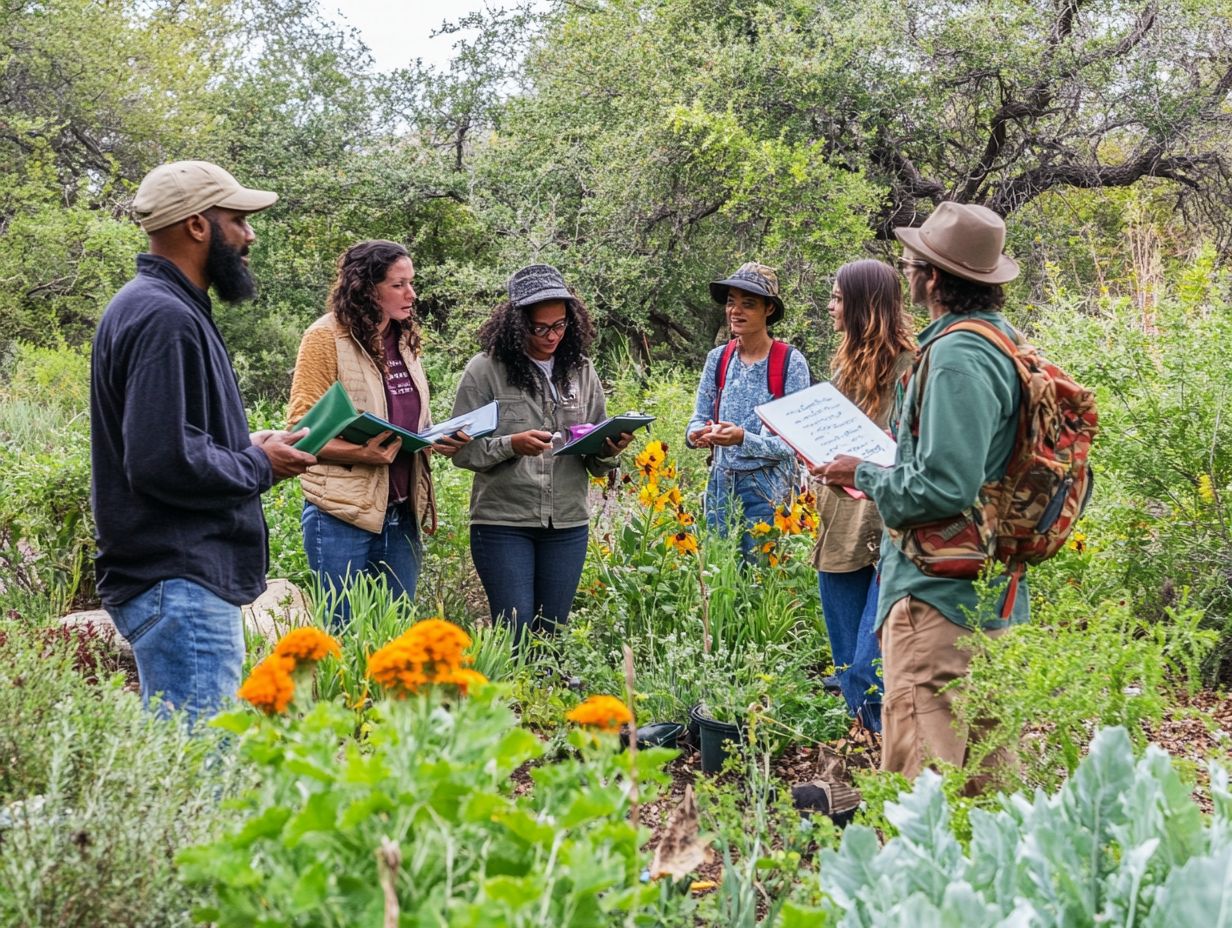
Working together strengthens community engagement and promotes social justice. Every voice matters in this journey.
This collaborative spirit not only strengthens the bonds among participants but also nurtures a shared sense of responsibility for the environment, encouraging sustainable practices that benefit everyone involved.
By pooling resources and knowledge, you and your community can implement permaculture initiatives that enhance local biodiversity and improve soil health. Community gardens serve as successful models of collective action, where locals come together not only to grow food but also to share skills and cultural practices.
These efforts provide food security and foster resilience against environmental challenges, showcasing the transformative power of cooperation in achieving sustainable goals.
Maintaining and Growing the Network
Maintaining and expanding a network of permaculture supporters is essential for achieving long-term success in community building. It empowers youth and champions social justice by facilitating effective resource redistribution.
This network not only fosters collaboration but also strengthens your impact in creating sustainable change.
Cultivating Relationships and Sustaining Momentum
Cultivating relationships and maintaining momentum within a permaculture network is crucial for encouraging community involvement and ensuring the ongoing relevance of social justice initiatives that address systemic inequalities.
By prioritizing mentorship opportunities, you can tap into the wisdom and experience of seasoned practitioners, paving the way for skill development and personal growth.
Creating opportunities for feedback lets participants influence the direction of our initiatives, ensuring that they evolve in alignment with community needs.
Sharing success stories fosters unity and inspires others to engage actively.
To keep these connections vibrant, organizing regular local events, workshops, and gatherings is key. This brings everyone together, reinforcing bonds while allowing for adjustments to strategies based on community feedback. This approach guarantees a dynamic and adaptive network that ultimately enriches the collective mission.
Frequently Asked Questions
What is permaculture and why is it important to build a network of supporters?
Permaculture is a sustainable approach to designing and managing systems that mimic the patterns and relationships found in nature. It is important to build a network of supporters for permaculture because it requires community involvement and collaboration to create lasting and impactful change. This includes integrating Indigenous knowledge and techniques that have been honed over decades.
How do I start building a network of permaculture supporters?

The first step in building a network of permaculture supporters is to educate yourself on permaculture principles and practices. This will allow you to effectively communicate the benefits and importance of permaculture to potential supporters, including how to engage with local permaculture initiatives, which can help draw interest.
Join us today and take the first step towards creating a sustainable future!
Who should I reach out to when trying to build a network of permaculture supporters?
You can reach out to a variety of individuals and groups, such as local farmers, environmental organizations, community leaders, and like-minded individuals who are passionate about sustainability and the environment. Connecting with Indigenous leaders provides valuable insights.
What are some effective ways to engage and connect with potential permaculture supporters?
Organizing events, workshops, and volunteer opportunities are great ways to engage and connect with potential permaculture supporters. You can also utilize social media platforms, participate in local community events, and join online forums and groups related to permaculture. Make sure everyone in the community can join.
How can I ensure the sustainability and growth of my permaculture network?
To ensure the sustainability and growth of your permaculture network, it is important to establish clear communication and goals, foster a sense of community and collaboration, and continuously seek out new supporters and resources to expand your network, including inclusive approaches to involve a wider range of participants.
Can I build a network of permaculture supporters even if I am not an expert in permaculture?
Yes, you do not need to be an expert in permaculture to build a network of supporters. Having a passion for sustainability is essential, along with a willingness to learn and collaborate with others who have knowledge and experience in permaculture. This includes reaching out to experienced individuals such as Lisa DePiano, Marcin Gerwin, and Silvia Di Blasio. Start connecting today!


